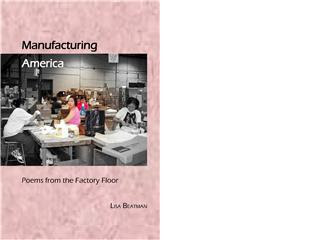
Manufacturing America
Poems From the Factory Floor
By Lisa Beatman
ISBN 978-0-6151-8124-0
61 pages at 14.95 soft cover
Ibbetson Street Press
25 School Street
Somerville MA 02143
Review by Laurel Johnson
Historically, since the America’s beginning, factory jobs have been held by immigrants hoping for a better life. Today those jobs are disappearing at a disturbing rate. With each manufacturing plant closure -- or relocation to foreign soil -- workers find themselves without jobs or income. Lisa Beatman’s second book gives readers a view of immigrants we won’t find on the news. Ms. Beatman’s hopeful immigrants come to us from the Mekong Delta, from south of the Rio Grande, from Europe, and every corner of the globe to become scrub women, fruit pickers, factory workers, meat packers. Immigrants today look to the “New World” for the same promise sought by our parents and grandparents:
This new world
was all coal-stink and pandemonium,
the shouts of men caught
by low ceilings and careened back,
twofold in strength.
In “Rainbow” young Chileans with calloused hands pick fruit while working their way across country to Boston, where they learn their colors and numbers making folders for a children’s hospital:
Juan is mute as a lake, but he knows
his colors: purple is A-F,
blue is G-K, yellow is L-P,
red is Q-T, green is U-Z.
His calloused hands, tattooed with paper cuts
sort the folders that will hold each child’s story.
In “Manufacturing America” Russian Jews come seeing a Cossack-free world. Regardless of what their profession was once, they work in factories so their families can eat:
These Russian Jews
conjugate each Wednesday
in class at the paper factory.
They bite their lips to say ‘visa’ and ‘vinegar’
They purse them to say ‘want ads’ and ‘why.’
For every worker in America, immigrant and non-immigrant, life has changed. “Hack Job” is a powerful poem that shares truths both painful and poignant. How will American workers -- and our country -- survive outsourcing and downsizing?
The bones of the body
are cracking
one by one
their marrow sacked
in a welter
of downsizing.
Hack,
one machine operator
on the dole,
hack
two secretaries
shopping with food stamps,
hack hack hack,
three departments
decapitated
How will the body live
with no framework
to hang its flesh on?
The boss just twists
the tourniquet
so we don’t bleed dry.
Who will stay the axe?
Who will trim the stumps?
How will we learn
to walk again?
Neither readers nor Ms. Beatman have the answers, but she presents facts for our consideration through exceptional poetry and prose. This book should be required reading in every school and university in America because it shines a kindlier light on immigrants and their struggles, a light seldom seen today.
Review by Laurel Johnson . Laurel Johnson is a reviewer for the Midwest Book Review.










































